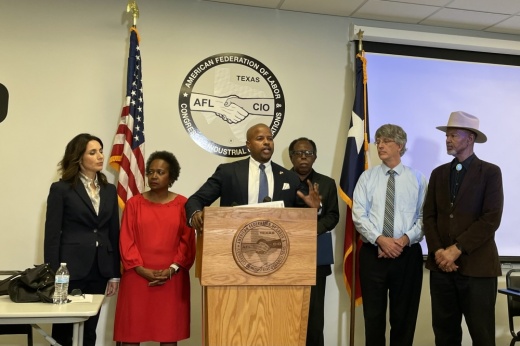The layoffs spanned 15 of the university’s 19 colleges and schools, including the now-shuttered Division of Campus and Community Engagement, Evans said. Forty staff members from the DCCE lost their jobs.
Faculty who were laid off were “devastated and shocked over what happened. ... They show up one day not expecting anything because everything's been dealt with, and they're given walking papers,” Texas NAACP President Gary Bledsoe said.
Evans, the incoming president for the Texas branch of the American Association of University Professors, was not laid off by UT.
How we got here
One week before the layoffs, state Sen. Brandon Creighton, R-Conroe, sent a letter to several universities reminding them to comply with Senate Bill 17, a law banning DEI offices and initiatives at all public colleges and universities in Texas. Lawmakers can freeze state funding or take legal action if universities do not follow the law, Creighton warned.
Before the law took effect Jan. 1, UT overhauled programs that once provided DEI services. Officials also closed the Multicultural Engagement Center and shut down Monarch, a program that helped undocumented and mixed-status students with financial aid, internship applications and more.
“More work [was] required to utilize our talent and resources most effectively in support of our teaching and research missions, and ultimately, our students,” UT Austin President Jay Hartzell said in an April 2 message to the university community.
Most terminated employees were given 60-day notices and expected to work through the end of May, Evans said.
“As a UT alum, I am mad, because this state has become a great state based on its diversity,” state Rep. Sheryl Cole, D-Austin, said.
One week after UT announced its layoffs in Austin, UT Dallas closed its Office of Campus Resources and Support, and eliminated 20 related positions on April 9.
Looking back
On May 19, Rep. John Kuempel, R-Seguin, told his Texas House colleagues that UT had identified 62 employees who worked in DEI-related roles.
“They will not lose their jobs,” said Kuempel, who sponsored SB 17 in the House. “They will be, I assume, reassigned to student services. ... I have been told that.”
Opponents of the law said they were "outraged" when they heard about the layoffs.
“These faculty members that were terminated, they were not DEI employees,” said Rep. Ron Reynolds, D-Missouri City, who leads the Texas Legislative Black Caucus. “So there was no reason for this termination. This was a breach of trust. ... They’ve made false promises, and we’re calling them out on it.”
What they’re saying
Bledsoe said the layoffs would “dumb down The University of Texas” by discouraging talented students and professors from coming to the university.
“Virtually overnight, UT Austin has gone from a champion player in the higher education ecosystem to a minor-leaguer,” Bledsoe said. “Sadly, the damage is self-inflicted. All of the programs that have systematically and inappropriately been eliminated aimed to promote student and faculty excellence, success and support in a university that has a history of discrimination.”
He told reporters the majority of terminated employees are women or part of ethnic and racial minorities.
In an April 11 open letter, around 350 UT students and alumni said the university “betrayed” them by laying off staff and closing “vital university divisions.”
“The integrity of our campus has been compromised by the lack of transparency and over-compliance executed by UT Austin administration,” the letter reads. “As the head of these efforts, President Hartzell has not only devalued the prestige of a UT Austin degree, but he has also violated the trust between himself and our campus community when he decided to prioritize legislative agendas over student and staff success.”
The letter invites Hartzell, Creighton and Amanda Cochran-McCall, who leads UT’s legal affairs division, to an April 19 town hall with students.





